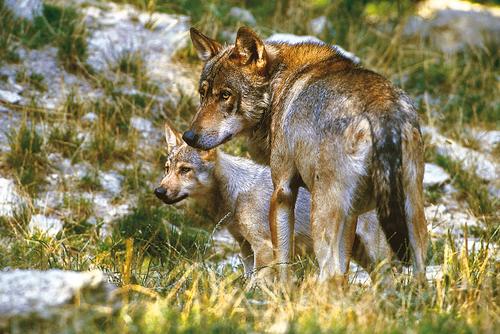A long-term study on the spread of wolves into West Poland, which has just been published, makes clear that, despite the continuing growth in numbers in West Poland and Germany, the future survival of this population is not certain.

In the western Poland more and more wolves raise their cubs - however, the population is not yet secured despite the pleasing numbers.
© Fritz SchimandlThe study entitled “Recovery of wolves and their ecology in Western Poland 2001-2019” gives a summary of developments in the wolf population in Western Poland since 2001. An important finding is that the sub-population in Western Poland is still vulnerable, since it is located relatively far from the source population in Northeast Poland. It is also clear that, in the initial phases of the colonization between 2001 and 2005, 50% of the attempts to establish populations in new areas failed after one or two years. It was only after seven years of strict protection of the wolves that 80% of the colonization attempts succeeded for more than two years, as is evidenced by the years 2006-2009.
By 2019 the number of wolves in West Poland and near the German border had increased from a few individuals to 95 packs. The wolf monitoring project financed by IFAW (International Fund for Animal Welfare) and EuroNatur, and carried out by the Polish conservation organisation AfN Wolf (Association for Nature Wolf), shows that suitable habitats were progressively taken over by the wolves. The initial colonizations were fairly slow and territories were far apart from each other. From around 2012, distances between territories decreased from up to 260 kms to an average of 25 kms. That the wolves in West Poland benefit from good habitat conditions is confirmed by an analysis which shows that the wolves’ diet is made up of 99% wild animals. It is expected that a further growth of the population will occur until all suitable habitats have been occupied.
“The population in West Poland is continuing on an upwards trend,” according to Andreas Dinkelmeyer from IFAW-Germany. “It is however clear that this trend could change drastically if the protected status of the wolf is removed or if potential habitats are destroyed. In order to avoid conflicts, we must actively pursue preventive strategies – only in this way we can protect grazing animals. Coexistence with the wolf works well everywhere where this strategy is consistently applied.”
“The population in West Poland demonstrates the huge importance of interconnected and largely natural forest areas. With the growth in wolf populations, however, the likelihood of contact with farm animals is likely to increase. In order to ensure a healthy coexistence of wolves and people in these cultural landscapes, it is critical that keepers of livestock are supported by well thought-out practical measures to protect their animals. This applies to both Poland and Germany. The evaluation and management of cross-border populations must therefore occur through cross-border cooperation by the responsible bodies. The new monitoring data from West Poland are very helpful in this context,” said Magdalena Kulisch, wolf project leader at EuroNatur.
Contact:
Anja Arning, EuroNatur, anja.arning(at)euronatur.org +49 7732 927213
Andreas Dinkelmeyer, Campaigns and Communications Manager ifaw, adinkelmeyer(at)ifaw.org +49 (0)173 6227539


